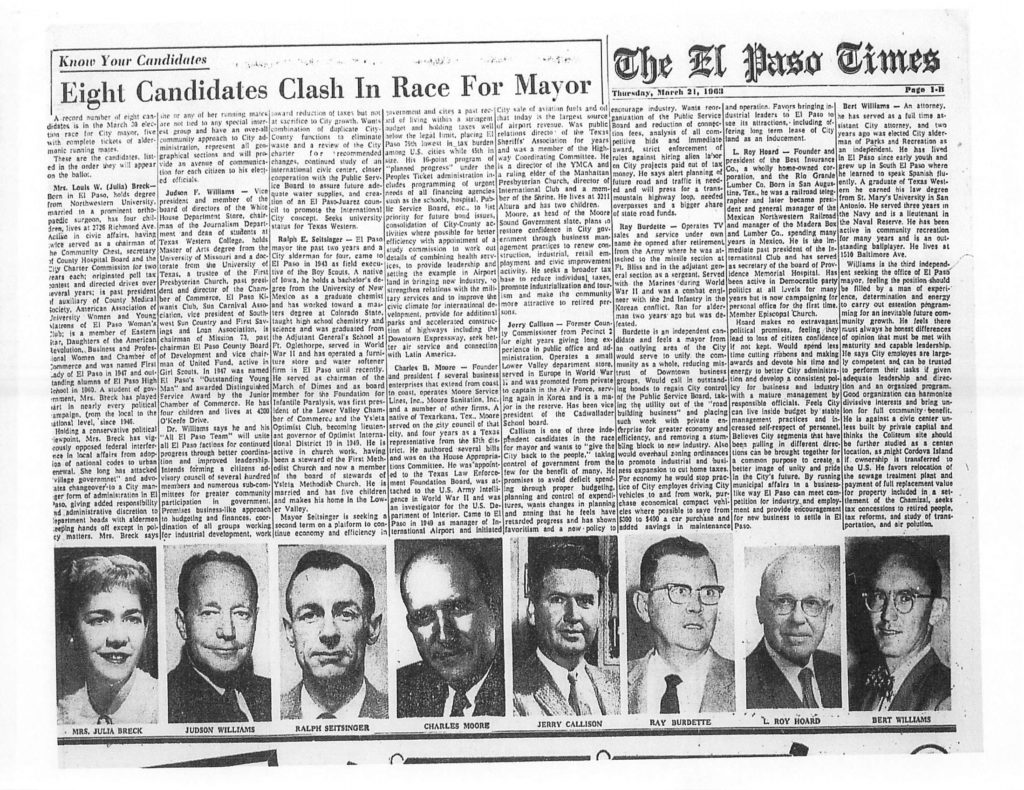In 1963, a record number of El Paso voters showed up to the polls, first in the general election and then in the runoff, to pick their next mayor. The race was between 7 men and one woman.
Even though incumbent mayor, Ralph Seitsinger was running for a second term, the race was still considered wide open and chaotic, like the previous mayor election in 1961 when Seitsinger was first elected over Julia Breck who was the first woman to run for El Paso mayor. The 1961 mayoral race between Breck and Seitsinger was very close. Both Breck and Seitsinger were on the ballot again in 1963.
Mayor Seitsinger’s term as mayor was controversial because of his attempt to implement a housing code in El Paso so that the city could receive federal funds for housing. He supported the creation of this code when he was running in 1961, this appealed to some in the business community who wanted access to loans offered by the federal government but before they could receive federal funds for housing , the city must have a housing code. Mayor Seitsinger tried to do this but receive opposition from others in the business community, tenements owners, and conservatives who did not want any federal involvement or inference from the federal government.
The city council meetings were dominated by vocal opposition to the code. Seitsinger was not able to get the support of the majority on the city council.During his term, Seitsinger also vetoed a city ordinance to desegregate public places but aldermen, Bert Williams, Ted Bender and others overrode his veto. Seitsinger spent years later in his life after politics explaining why he vetoed the ordinance. Seitisinger said he had already got the verbal commitment from businesses that they would voluntarily desegregate ,but Seitsinger was glad the law passed.
Bert Williams decided to jump in the mayoral race running as an independent, challenging the ticket system which was in place in El Paso city elections for decades. Previously each mayoral candidate would run with a slate of candidates for aldermen but Williams and several others were running with no slate.
Judson Williams emerged as the front-runner and the main opponent to beat. Williams was the Dean of Students at the Texas Western College and also served as President of the Board of Directors for the Whitehouse Department Store. Williams campaigned to unite political factions through the creation of a Citizen Advisory Committee to study issues and come up with solutions. Williams wanted to come up with a new city charter. He pointed to his experience in business and his community involvement. Williams opposed a housing code but later, as mayor, he did push a code that passed with little opposition. His “All El Paso Ticket slate of candidates included Hector Bencomo, who’s family owned Ruidoso Grocery; Ashley Classen, who served as superintendent of El Paso City Works; Joe Walters, a manager of the Sears located in five points; and Oliver Nordmarken, a retired FBI agent, and attorney. All of Williams’ ticket was elected expect Walters. Charles Moore and Roy Hoard both ran as a businessman on their owns tickets.
Joseph Longo
EPHS Volunteer

